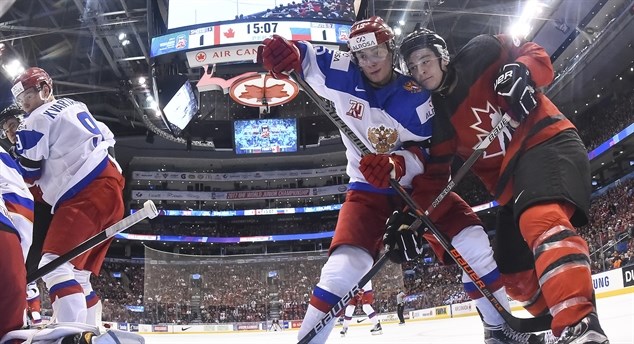
Canada and Russia/Soviet Union have won 29 of 40 U20 gold medals, so it's no surprise they're back in the semi-finals this year. Photo: Matt Zambonin / HHOF-IIHF Images
Plenty to study, but no Y2K glitches here
As teams set up shop in Montreal for the final four games of the 2017 World Juniors at the Bell Centre, we pause to take a look at some curious facts.
*Of the four teams left in the tournament, each one has particular tendencies when looking at scoring by period. Canada, for instance, leads all teams with 15 goals in the second period while allowing only three. But slow starts are cause for concern. The team has just four first-period goals in five games, by far the fewest.
Sweden, on the other hand, leads all teams with ten goals in the first, allowing only two, so the score of the first period tomorrow night might well be the most important factor in the outcome of the Canada-Sweden game.
The Americans have balanced scoring in the first and second, eighth goals in each, but have managed only four in the third, while Russia and Sweden have each scored eight in the third. Russia’s 8-2 cumulative score in the third is the best, though.
The Americans and Russians are also the most resilient in the third, having surrendered only two goals each in the final 20 minutes. Russia is most vulnerable in the second, having given up five goals, the most of the semi-finallists.
*It should come as no shock that Canada and Russia are in the semi-finals. The teams have won 29 of 40 previous gold medals (Canada 16, Soviet Union/Russia 13). Finland has won four (1987, 1998, 2014, 2016), the United States three (2004, 2010, 2013), the Czechs two (2000, 2001), Sweden two (1981, 2012).
*Canadian defenceman Thomas Chabot is having a monster tournament, both for ice time and scoring by a defenceman. He leads all blueliners with three goals and seven points, and Canada’s defensive corps leads all teams with four goals and 19 points. The Swedes are second (2+14), followed by USA (1+12) and Russia (2+9).
*Remember Y2K? It was going to play havoc with the world’s computers at the end of day on December 31, 1999. No horrible scenario unfolded, though, and the IIHF is in the same situation here.
That is, for the first time ever, players born in the 2000s are playing at the World Junior Championship. Sweden’s Rasmus Dahlin was born on 13 April 2000 and Switzerland’s Nico Gross was born on 26 January 2000. Dahlin made a successful debut last week, scoring once and adding an assist in a 6-1 win over Denmark.
*Of the ten coaches at the 2017 U20, four are making their IIHF debuts as head coaches: Dominique Ducharme (CAN), Christian Wohlwend (SUI), Tomas Monten (SWE), Bob Motzko (USA).
None of the returning coaches have senior experience at the IIHF. All have coached only U18 or U20 tournaments.
Monten is the youngest coach (39 years old), and Valeri Bragin (RUS) is the oldest (60).
*Canada is the only team not to have named three goaltenders to its roster. Connor Ingram and Carter Hart have played all games, but in the case of injury the team can add one more puckstopper and, being at home, the third goalie is only a short drive or flight away.
*Some nine players celebrate birthdays during this year’s U20: Urho Vaakanainen (FIN) will turn 18 on New Year’s Day; Nico Hischier (SUI) will turn 18 on January 4, the same day Miroslav Sturska (SVK) turns 20; Yannick Zehnder (SUI) is 19 on 29 December; Gabriel Carlsson (SWE) is 20 on 2 January as is Blake Speers (CAN); Renars Krastenbergs (LAT) scored a goal on his 18th birthday on 26 December; Mikhail Vorobyov (RUS) turns 20 on medal day, 5 January; and, Marek Hecl (SVK) turns 19 on 30 December.






